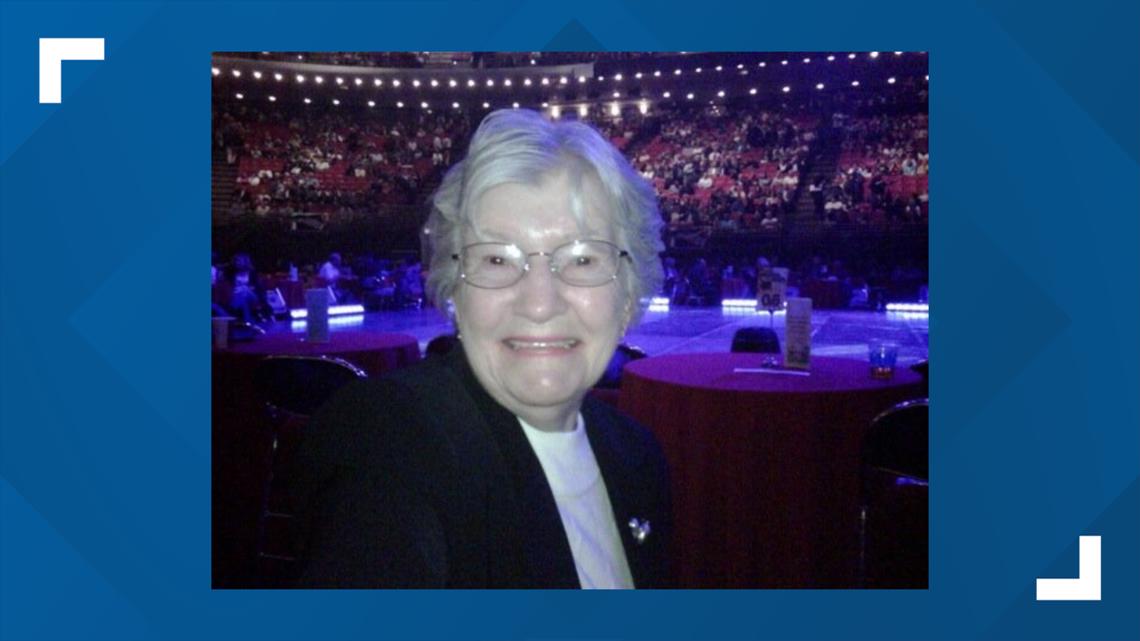DALLAS — Lori VanNess and her grandmother Doris Wiseley share a special bond.
VanNess’ mother died when she was 6, and Wiseley raised her since the age of 9.
Since March, they’ve been kept apart with the 98-year-old Wiseley confined to her room at Carrara, a Plano nursing home and rehabilitation center.
“This is the longest I've been apart from my grandmother since I was born,” VanNess said.
While dropping off items for her grandmother, VanNess says she was shocked to learn the facility planned to take in COVID-19 positive hospital patients.
“I was appalled. Absolutely horrified. And immediately thought that this is a death sentence,” VanNess said. “This is just unacceptable that the government is allowing this to happen.”
Statewide, it’s unknown how many nursing homes are admitting COVID-19 patients. That’s because the state does not require nursing homes to report that they accept COVID-positive patients from hospitals.
"There is not a specific requirement for nursing facilities to report whenever they are accepting COVID-19 patients from hospitals,” said Elliott Sprehe, a spokesman for the Texas and Health and Human Services Commission.
WFAA has learned there are more than two dozen facilities in North Texas that have opened designated COVID-19 wings. This allows such facilities to accept COVID-19 infected patients from hospitals or other nursing homes and assisted living facilities.
Questions also arise about the overall track record of at least some of the nursing homes opening COVID-19 wings, according to a WFAA review.
Of those facilities that have opened designated COVID-19 wings, at least nine have received a one-star or two-star overall rating out of a possible five stars by federal regulators.
That means those nursing homes were considered “below average” or “much below average” based on a federal review of staffing, quality control and health inspections.
Carrara – the facility where VanNess’ grandmother lives – has a five star, or “much above average” rating.


“I'm sure there are facilities that can pull this off. They're well-funded, they're well-staffed, they're well-trained,” said J.T. Borah, an attorney specializing in nursing home abuse and neglect cases. “Those should be the ones who are identified by the state, as facilities that should be doing this, should be engaging in this program.”
Borah told WFAA that he’s concerned Texas regulators aren’t proactively reviewing the track record of nursing homes for quality and infectious disease controls prior to being allowed to open COVID-19 wings.
“Just letting anyone or any facility do it, who simply wants to do it without demonstrating an ability to properly care and contain the virus is irresponsible,” Borah told WFAA. “It’s basically a reactive mindset as opposed to proactive, and lives are at stake at this point.”
Gov. Cuomo criticized over directive
Back in late March, New York Gov. Andrew Cuomo was heavily criticized after he issued a March 25 directive ordering nursing homes to accept “medically stable” COVID-19 positive patients.
“COVID-19 has been detected in multiple communities throughout New York State,” the directive said. “There is an urgent need to expand hospital capacity in New York State to be able to meet the demand for patients with COVID-19 requiring acute care.”
Under pressure, Cuomo reversed course about six weeks later, blocking nursing homes from accepting COVID-19 positive hospital patients.
“Hospitals going forward cannot discharge a patient to a nursing home unless the patient tests negative for COVID 19,” Cuomo said during a May 10 press conference.


In July, Cuomo’s health department issued a report that showed more than 6,300 patients were admitted to nursing homes between March 25 and May 8. However, the report failed to deal with the question of whether the policy led to more nursing home infections or fatalities.
The report says 58 nursing homes did not have any cases of infected staff or residents prior to the admission of a COVID-19 positive patient from a hospital. The report did not address whether any residents or staff got sick or died, and if they did, whether it related to the admission of COVID positive patients.
Texas opens door to COVID-19 patients
Meanwhile, Texas has opened the door to COVID-19 positive hospital patients being admitted to nursing homes.
In a statement, Sprehe told WFAA that in order for a Texas nursing facility to be a “designated COVID-19 facility or offer a dedicated COVID-19 wing, that facility needs to be able” to separately group “residents effectively, have sufficient staffing and sufficient” personal protective equipment.
He also told WFAA in a statement that “facilities should have staff dedicated to working with each group of residents (COVID-19 positive, COVID-19 negative and unknown COVID-19 status) and staff, including direct care and housekeeping staff, should not work with more than one group of residents.”
The HHS department’s “COVID-19 response for nursing facilities” also says “when possible” there should be a “separate entrance.”
“Nursing homes don't have the best track record for caring for people. They just don't,” said Brian Lee, a former nursing home regulator and executive director of Families for Better Care. “Texas still ranks the worst of the country when it comes to overall quality and safety for nursing homes. It just hands down, it does.”
Lee is largely correct with Texas being at or near the bottom in reviews ranging from Care.com and Becker’s Hospital Review to Forbes and Baylor University reports.
“They [state regulators] need to get their arms around this they need to get involved, like right now,” Lee told WFAA.
Lee says there’s a financial incentive for nursing homes to take in COVID-19 patients, largely because it helps them fill their beds. Plus, the sicker the patient, the higher the reimbursements from Medicare and Medicaid.
Industry representatives defend practice
Texas Health Care Association CEO Kevin Warren disagrees with Lee. He says Texas nursing homes generally provide quality care to seniors.
“I absolutely think that the oversight is there from the state level,” said Warren, whose group represents long-term care facilities in Texas. “I mean, you're talking about a profession that's one of the most highly regulated professions in the country.”
In fact, he says accepting COVID-19 hospital patients frees up critical acute care bed space and exemplifies how nursing home and assisted living facilities have stepped up to help the communities they serve.
“This is the type of stuff that facilities are willing to take in order to be partners in the community and help fight against COVID that is affecting everybody,” he said.
Dallas County, unlike Denton or Collin counties, requires facilities to submit plans to gain designation for a COVID-19 positive wing prior to opening it.


Carrara – where VanNess’ grandmother lives – is owned by Cantex Continuing Care Network. The company also operates a COVID-19 unit at its Windsor Gardens facility in Lancaster.
Cantex told WFAA in a statement that it set up COVID-19 units at Windsor Gardens and Carrara “at the request of local health authorities and hospitals nearing capacity.”
“These units have protective doors and only staff working in the unit are permitted to enter,” a company spokeswoman said. “Those staff do not enter or interact with other parts of the facility.”
The company also said the company opened up the designated COVID-wings with “careful planning and support from employees as well as existing staff and families.”
VanNess told WFAA, however, that she was not involved in any planning, and only found out when she overheard a conversation at Carrara the day before the facility began taking in COVID-19 hospital patients.
Carrara’s spokeswoman told WFAA that both facilities each accepted more than 40 COVID-19 patients in August. As of last week, there were 21 patients in the COVID wing at Carrara and six at Windsor Gardens.
“Cantex Continuing Care Network rose to the challenge when our community needed us to serve patients, their loved ones, and the larger Dallas area during these difficult times,” Robin Underhill, company CEO told WFAA in a statement. “The measures we implemented are successfully inhibiting the spread of the virus and enabling the best recovery possible. We appreciate the ongoing help and support we’ve had from our patients and their families as we navigate this pandemic.”
The company also provided testimonials from the families of four patients.
“I’m happy to report that my family has not contracted COVID and I know it’s because of the precautions Carrara has taken to ensure it doesn’t spread,” one family member said.
Another family member wrote that the staff “has kept me informed of the COVID-related status” since the pandemic hit in March. “This is such a huge relief to know that I am being contacted and I can also reach you at any time during this pandemic,” the family member said.


Still, VanNess remains worried, fearing that her grandmother could contract COVID-19.
Her grandmother has endured a lot. A native of England, Doris Wiseley served in the Royal Air Force as a radar operator. She met VanNess’ grandfather, then a member of the U.S. Navy, before emigrating with him to the United States.
“She’s English,” her granddaughter said. “She really tries to have that stiff upper lip.”
She’s tried – albeit unsuccessfully – to convince her grandmother to leave the nursing home, and come live with her.
“She doesn't understand that it could actually be a blessing and that I would love to do that.” VanNess said, “But she is adamant that she does not want me to be burdened to take care of her and that she is happy where she is.”
Last month, state officials announced that limited visits would be allowed at long-term care facilities with no COVID-19 cases. State regulators confirmed to WFAA that any facility taking in COVID-19 patients will not be permitted to allow visits as long as they have positive cases.
“Facilities who are part of the local solution, in essence, it’s held against them,” said Warren, the head of the industry trade association in Texas.
For VanNess, that means she will not be able to see her grandmother any time soon.
“I just know [COVID-19] would be a death sentence,” she said. “All I can do is pray every day that she doesn't get it.
Email: investigates@wfaa.com



